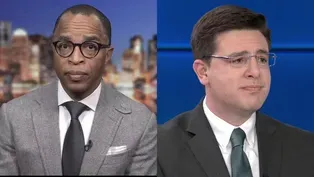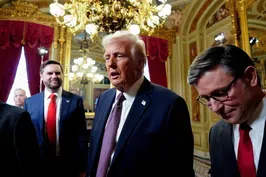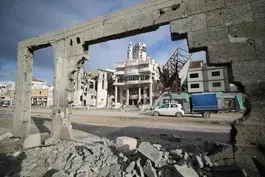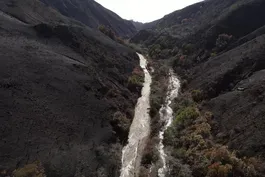
Top UN humanitarian official on the situation in Gaza
Clip: 2/7/2025 | 5m 12sVideo has Closed Captions
Top UN humanitarian official describes the current situation in Gaza
One of the key United Nations agencies overseeing the provision of aid into Gaza is the United Nations Office for the Coordination of Humanitarian Affairs, or OCHA. Its leader, Tom Fletcher, just visited Gaza and joined Geoff Bennett to discuss what he saw there.
Major corporate funding for the PBS News Hour is provided by BDO, BNSF, Consumer Cellular, American Cruise Lines, and Raymond James. Funding for the PBS NewsHour Weekend is provided by...

Top UN humanitarian official on the situation in Gaza
Clip: 2/7/2025 | 5m 12sVideo has Closed Captions
One of the key United Nations agencies overseeing the provision of aid into Gaza is the United Nations Office for the Coordination of Humanitarian Affairs, or OCHA. Its leader, Tom Fletcher, just visited Gaza and joined Geoff Bennett to discuss what he saw there.
How to Watch PBS News Hour
PBS News Hour is available to stream on pbs.org and the free PBS App, available on iPhone, Apple TV, Android TV, Android smartphones, Amazon Fire TV, Amazon Fire Tablet, Roku, Samsung Smart TV, and Vizio.
Providing Support for PBS.org
Learn Moreabout PBS online sponsorshipGEOFF BENNETT: One of the key agencies overseeing the provision of aid into Gaza is the U.N. Office for the Coordination of Humanitarian affairs.
Earlier today, I spoke with its leader, Tom Fletcher, who was in Gaza earlier today and joined us from Jerusalem.
You were in Gaza earlier today.
What did you witness, especially in the areas that were harder to reach due to the fighting?
TOM FLETCHER, United Nations Under-Secretary-General for Humanitarian Affairs and Emergency Relief Coordinator: Well, thanks.
I came in through the north, which is the area worst affected by the conflict of the last 14, 15 months.
And it's desolate, and it's being pummeled.
You can't tell what was a house, what was a school, what was a hospital.
And you see civilians picking through the wreckage, returning to their homes.
And it takes some time to even find where their homes were, because everything has been flattened.
So it's grim.
It's desolate.
But they are heading home and they are trying to rebuild.
GEOFF BENNETT: Parts of Northern Gaza were on the brink of famine.
What's the situation now?
TOM FLETCHER: They were.
So, two-and-a-half weeks ago, when we got the cease-fire in place, we were very, very worried about starvation levels and famine.
We have now got two-and-a-half weeks of trucks, convoys.
Almost 14,000 trucks have gone in that time.
So we have made progress in getting food to those who need it, to the survivors.
And the risk is receding of famine.
We have got food to a million people.
But the needs are still massive.
I'd say the biggest needs right now are tents, shelter, because a lot of people are trying to head back to where their homes were.
And winter is here.
It's very, very cold, wintry conditions.
So we have got to get them something to sleep under.
GEOFF BENNETT: And what challenges remain when it comes to distributing that aid, given just the sheer scale of desperation and need?
TOM FLETCHER: Well, you're right.
It's the scale that is so significant, that is so massive.
I have been in Sudan recently in Darfur.
I have been in -- on the Ukrainian front lines.
I have been across Syria.
And nothing matches what we're trying to do in Gaza right now.
The good news, though, is that, since the cease-fire -- and this is credit to everyone who got that cease-fire in place -- it's become much, much easier to ship in 600, 700 trucks every day of lifesaving equipment.
So the biggest need we have right now is hold that cease-fire open.
Every day the cease-fire lasts, we're saving lives.
GEOFF BENNETT: Israel, as you well know, has passed a law banning UNRWA from operating within Gaza.
What has been the impact of that and is that organization still distributing aid?
TOM FLETCHER: So UNRWA is the largest of the U.N. operations working in Gaza, and it's absolutely indispensable.
It's the backbone of that operation, and particularly in the education and health sectors, where it takes the lead.
And no other agency, no other U.N. agency, no other organization, frankly, including the Palestinian Authority, can step in and can deliver education at that scale.
But, of course, UNRWA is also operating in Jordan, Lebanon, across the region.
And those operations are continuing unimpeded.
GEOFF BENNETT: And, meantime, the Trump administration is in the process of hollowing out USAID.
What might be the effect of that in Gaza?
TOM FLETCHER: Well, I don't think you build a golden age by retreating from the world.
The U.S. has been an incredibly generous, a humanitarian superpower for decades now.
It's led the world, almost half of some of the humanitarian campaigns funded by the Americans.
And I think Americans are right to ask us to be more efficient, more innovative, to make sure that more of that aid reaches the people who need it so badly.
But without that support, and I hope this is only a temporary freeze, we won't reach tens of millions of people who in the past have been supported by the generosity of the American government and ultimately the American people.
GEOFF BENNETT: How are Gazans and the regional stakeholders to whom you have spoken, how are they responding to President Trump's idea for the U.S. to take ownership of Gaza, for its reconstruction?
He's also suggested that Gaza should be emptied of its population.
How is the region responding to that?
TOM FLETCHER: So most of them right now are searching through the rubble for their family members, for their loved ones.
So that's what they're thinking about.
They're thinking about the next meal, and they're trying to stay warm.
But everyone mentioned it to me.
And what they all say is, firstly, tell our story.
Get the media in.
Someone has to see what's happened to us.
The second thing they say is, well, someone, ask us.
They feel that no one's actually consulted them on this plan.
And they're the ones who are being threatened with this movement, with being displaced once again.
And then the third thing they say is, this is the land we were born in.
This is - - these are the homes that our parents and grandparents built.
We have been displaced so many times that we keep on rebuilding.
And they're going back.
There's a defiance there.
They're determined to survive.
And they're determined to survive on their own land.
GEOFF BENNETT: A defiance and a determination.
Tom Fletcher, thank you for joining us this evening.
TOM FLETCHER: Thank you.
A Brief But Spectacular take on making each day opening day
Video has Closed Captions
Lawrence Chu's Brief But Spectacular take on treating each day like a grand opening (3m 50s)
Capehart and Continetti on Trump's executive power
Video has Closed Captions
Capehart and Continetti on Trump pushing the limits of executive power (10m 53s)
Chicago Fed president on the new jobs report and economy
Video has Closed Captions
Chicago Fed president on what the new jobs report says about the economy (6m 37s)
Congress struggles to keep up as Trump reshapes government
Video has Closed Captions
Courts and Congress struggle to keep up with Trump as he reshapes American government (8m 19s)
Displaced Gazans return to face uncertain future
Video has Closed Captions
Displaced Gazans return to face shattered homeland and uncertain future (3m 32s)
The growing concerns around the boom in sport betting
Video has Closed Captions
The growing concerns around the boom in sport betting (8m 31s)
News Wrap: Heavy rains in California trigger landslides
Video has Closed Captions
News Wrap: Heavy rains in California trigger landslides (4m 59s)
Providing Support for PBS.org
Learn Moreabout PBS online sponsorshipMajor corporate funding for the PBS News Hour is provided by BDO, BNSF, Consumer Cellular, American Cruise Lines, and Raymond James. Funding for the PBS NewsHour Weekend is provided by...



















